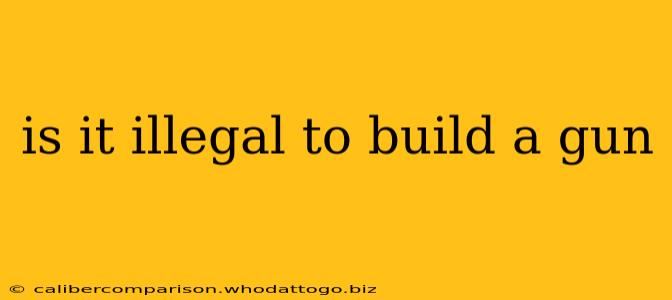The question of whether it's illegal to build a gun is complex and depends heavily on several factors, including your location, the type of firearm you're building, and your intentions. There's no single, straightforward answer. This guide aims to clarify the legal landscape surrounding homemade firearms in the United States. Note: This information is for educational purposes only and should not be considered legal advice. Always consult with a legal professional for guidance on specific situations.
Federal Regulations: The National Firearms Act (NFA) and the Gun Control Act (GCA)
Federal law governs the creation and possession of certain firearms. Two key acts play a significant role:
-
The National Firearms Act (NFA) of 1934: This act regulates certain types of firearms considered more dangerous, including machine guns, short-barreled shotguns and rifles, silencers, and destructive devices. Building these firearms without the necessary licenses and permits is strictly prohibited and carries severe penalties.
-
The Gun Control Act (GCA) of 1968: This act regulates the manufacture, sale, and possession of most firearms. While it doesn't explicitly prohibit building a firearm, it does place restrictions on who can manufacture them and how they are sold. For instance, unlicensed individuals are generally prohibited from manufacturing firearms for sale or distribution.
State Laws: A Patchwork of Regulations
State laws regarding homemade firearms vary considerably. Some states have stricter regulations than others, with some explicitly prohibiting the construction of certain types of firearms, while others may have less stringent rules or none at all. It's crucial to research the specific laws in your state before attempting to build any firearm. These laws often address issues like:
- Licensing requirements: Some states may require licenses to manufacture firearms, even for personal use.
- Registration requirements: Built firearms may need to be registered with state authorities.
- Types of firearms permitted: Certain designs or modifications might be illegal to create.
- Background checks: Even for personal use, background checks might be required.
Key Considerations When Considering Building a Firearm
Before even considering building a firearm, carefully weigh these factors:
- Legal ramifications: Understand the federal and state laws completely. Ignorance of the law is not a defense.
- Safety concerns: Building a firearm requires expertise and precision. Improper construction can lead to malfunctions and serious injury or death.
- Ethical considerations: Responsible gun ownership involves understanding the potential risks and implications of owning and operating a firearm.
Resources for Further Information
For accurate and up-to-date information on firearm laws, consult these resources:
- Bureau of Alcohol, Tobacco, Firearms and Explosives (ATF): The ATF website provides information on federal regulations regarding firearms.
- Your state's attorney general's office: This office can provide information on state-specific firearm laws.
Disclaimer: This information is intended for educational purposes only and should not be construed as legal advice. The laws surrounding firearm construction and possession are complex and subject to change. It's imperative to consult with legal counsel before undertaking any activities related to building or possessing firearms. Building a firearm improperly can have severe legal and safety consequences.

